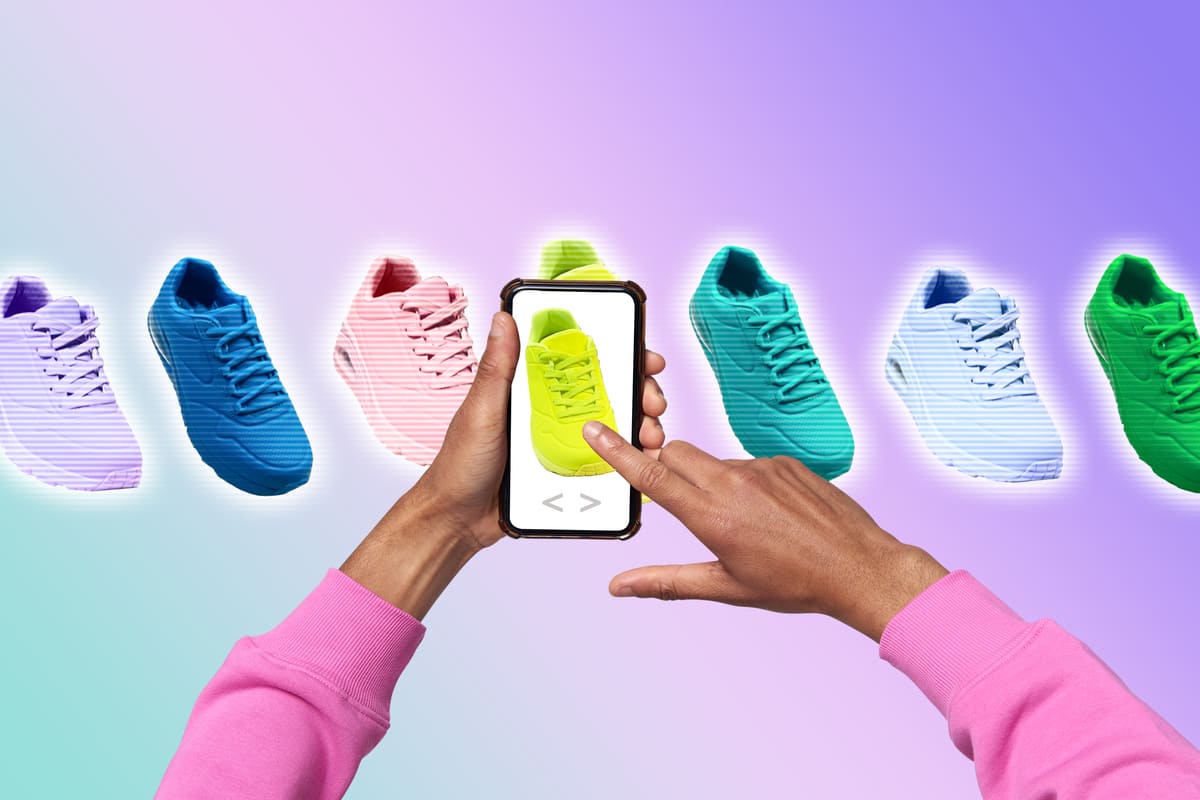When you log into online platforms such as your email or social media, you may have observed ads tailored for you. You may have also noticed product suggestions that match your interests. This is personalized marketing at work. In this guide, we’ll uncover the essence of personalized marketing, its influence on customer behavior and how harnessing its power can enhance business outcomes.
What is personalized marketing?
Personalized marketing, also known as one-to-one or individual marketing, employs data analysis and digital tech to provide tailored messages and offerings to customers. It’s about delivering content that suits a person’s traits, preferences and actions.
This content shines by making consumers feel valued and seen. It is customized using basic tactics such as using names in emails and advanced AI-driven strategies for understanding needs. As we explore examples and define personalization, remember: successful personalization aims for connection beyond selling and targets enhanced customer engagement.
Benefits of personalized marketing
There are a lot of ways that personalized marketing can help a business. This includes ensuring a better customer experience, encouraging customer loyalty, and increasing revenue. We’ll look at these below.
Improved customer experience
Customers increasingly expect customized interactions. Personalizing content initiates stronger brand-customer relationships and boosts satisfaction with customer service, as indicated by a report linking personalization to positive customer response.
Increased customer loyalty
Tailored communication and offerings resonate deeply with many customers. This idea is supported by research conducted by SmarterHQ, which indicates nearly 72% of consumers report engaging only with messages targeting their interests, underlining the potency of one-to-one marketing.
Better return on investment (ROI)
Strategically investing in personalized marketing yields substantial ROI. Tailoring goes beyond messages to timing and placement. Precise data acquisition and targeted use leads to more cost-effective campaigns.
According to statistics from Barilliance, e-commerce sites experienced a lift in revenue of up to 12% after deploying real-time personalization tactics across various channels.
If you want to help bring these benefits to your company, or if you want to start a career in marketing for hospitality, one of the best ways to get started is with a degree course.
The future of customer engagement is personal, so join Les Roches to learn the tailored techniques that maximize results.

Challenges of personalized marketing
When you’re considering personalized marketing, recognizing the challenges it presents is a crucial part of making a strategy. There are three significant hurdles most organizations grapple with: gathering data, striking the right balance and allocating sufficient resources.
Gathering data without hassling customers
Comprehensive customer understanding requires data gathering while respecting privacy. Customers need to feel willing to share their data, so transparency is key and clearly explaining the purpose of data gathering helps build trust. Striking the right level of subtlety
Successful personalized marketing hinges on subtle messaging that guides prospects organically. Overly aggressive approaches can be alienating, while subtlety steers prospects toward discoveries within your brand’s offerings.
Allocating enough resources
Effective personalized marketing demands careful setup and ongoing management. Customized strategies require significant time, technological investment and human effort, so regular assessments help ensure they are executed smoothly.
Creating a successful personalized marketing strategy

Alongside careful planning, there are four key steps for building a strategy: forming a dedicated team, respectful data collection, audience segmentation and choosing where to personalize.
Building an effective team
Succeeding in personalized marketing demands a skilled team that drives personalized content across customer touchpoints while preserving brand integrity. This core team includes personnel such as content creators skilled in tailoring messaging and revenue managers uncovering focused income streams.
Respectful data collection
Responsible data collection is key. Customers value transparency, so obtaining consent before gathering data is necessary. Respect means informing customers about data usage, enhancing understanding through pop-ups or terms agreements.
Segmenting your audience
Audience segmentation is essential as categorizing audiences helps target messages to specific needs or interests based on demographics and behaviors.
Choosing personalization
Personalized marketing isn’t just tailored messages. It should also demonstrate genuine acknowledgement of each consumer’s unique identity. Websites and email are good starting points, but social media can offer direct conversations with individuals.
Learning how to create a personalized marketing plan requires industry experience along with a good education. Marketing for hospitality is often covered in depth by hospitality degrees, helping you get ahead.
Learn the essential of creating customer connections that resonate and deliver results with an advanced degree from Les Roches

Examples of personalized marketing campaigns
Personalized marketing approaches have reshaped brand interaction and relatability. Let’s explore some examples.
-
Targeted emails
Sending emails customized with recipients’ names, previous interactions or exclusive offers helps actively engage customers and is more effective than sending generic messages.
-
Custom video messages
AI-driven videos can help to customize any video message, giving each client their own welcome message or advice, much like sending a customized email, but more likely to be noticed. The AI can take your list of clients and make a video for each one.
-
Product recommendations
Offering personalized product suggestions can enhance cross-selling efforts, benefiting revenue growth and customer satisfaction.
-
Social media marketing
Platforms such as Facebook, Twitter and Instagram can customize content based on interactions, maximizing engagement through precise targeting.
-
Fear of missing out (FOMO)
Limited-time offers can capitalize on FOMO, nudging quick decisions and intensifying emotional connections.
By using these strategies, you can cultivate special consumer connections that drive revenue growth, which demonstrates the value of personalized marketing.
Personalized marketing statistics and trends to watch for
Consumers are increasingly demanding more than just generic messaging. Creating a business plan that incorporates using personalized content in marketing efforts is essential. Below are some statistics and trends that underscore the significance of tailored content for businesses.
Growing customer expectations
As a one-to-one marketing tool, personalization has set the bar high when it comes to customer expectations. According to a report by Epsilon, 80% of clients said they’re more likely to do business with companies offering personalized experiences.
Purchasing behaviors
Studies suggest marketing personalization significantly influences purchasing behaviors. According to Deloitte, 49% of customers bought items they didn’t initially intend to buy due to personalized recommendations from the brand.
Email transaction rates
According to Campaign Monitor, emails with personalized subject lines are 26% more likely to be looked at by recipients. The correlation between personal advertising and increased email efficacy highlights the importance of personalized marketing for retaining customer interest and nurturing loyalty.
Customers’ preferences
It seems clients are not shy about their desire for tailored engagement as, according to SmarterHG, 90% of them say they like custom ads. This underlines why personalization is important in creating deeper connections.
Email open rates
Is it worth putting additional time into crafting uniquely targeted emails? Absolutely. Figures from Experian indicate personalized emails can result in a six-fold increase in transaction rates. Despite this, only 39% of online retailers send personalized suggestions via email, so this is an untapped growth area.
AI-Powered personalized marketing
Artificial Intelligence (AI) is playing an instrumental role in creating dynamic personalization at scale. By predicting buying patterns based on past activity or demographic information, businesses can create hyper-targeted campaigns that lead to enhanced conversions and ultimately more sales.
Brands such as Netflix or Amazon have notably leveraged AI-powered recommendation engines for success, demonstrating how AI technology’s capacity allows effortless predictive customization at scale while maintaining user specificity.
Greater success rates for personalized marketing efforts can be gained by embracing trends such as addressing customer expectations accurately, learning purchasing behaviors, increasing email responsiveness, acknowledging customer preferences and investing wisely in AI-powered solutions.
Common questions about personalized marketing
When examining the world of personalized marketing, several core concerns come to the fore. To help you understand these better, let’s look at some of the most common queries about the topic.
Why is personalized marketing important?
Personalized marketing is a significant tool and proving to be an indispensable element of successful brand strategies. It scores well on three fronts:
- Individual focus: one-to-one marketing treats each customer as a unique entity, catering to their specific preferences and behaviors
- Improved engagement: it promotes deeper engagement by providing personalized content tailored to individual needs
- Boosts sales: by enhancing user experience, personalized marketing helps drive higher conversion rates
In a digital age where customers are inundated with information overload, standing out from the crowd with personalization is key.
What is an example of personalized marketing?
To illustrate how profound the effects can be, consider Amazon, a pioneer in individualized marketing strategy. Not only does Amazon greet its users by name, it also provides its AI-driven product recommendations based on previous search history and purchases. This strategy is said to account for 35% of sales.
Another example is Spotify with its popular ‘Discover Weekly’ feature that harnesses machine learning algorithms to curate playlists according to users’ tastes and listening habits.
How effective is personalized marketing?
Personalization is not simply a trend, it is a key element in contemporary advertising and is an essential topic for individuals studying marketing and business degrees.
A report from Accenture stated that more than 90% of consumers are more likely to shop with brands who recognize them individually, provide relevant recommendations and remember their preferences.
Imagine receiving a generic email versus one handcrafted carefully and genuinely addressing your particular pain points. Personal advertising through emails has demonstrated an impressive open rate of 18.8% contrasted with non-personalized emails at 13.1%.
Relationships with personalized marketing
Personalized marketing thrives on relationships, shaping and being shaped by them as tailored content forges emotional bonds, intensifies trust and drives repeat purchases.
Insights gained can help improve future marketing strategies. In successful campaigns, a loop forms: personalization deepens ties, refining interactions and renewing the cycle. Lasting relationships can form as a result of effective personalized marketing.
Used in personalization
Personalized marketing allows businesses to fine-tune content delivered to their customers. This individual approach is achieved by leveraging tools and technologies alongside a robust strategy. Among these are:
- Customer Relationship Management (CRM) platforms that allow businesses to analyze customer behaviors and patterns over time
- Marketing automation tools that enable the automatic creation of personalized content based on triggers or specific user actions
- A/B testing tools that help firms optimize personalized campaigns through rigorous testing and evaluate what works best for different segments
- Analytics, fed by Big Data, helps companies understand users’ preferences, enabling them to customize marketing efforts accordingly
For personalization in marketing
To incorporate personalization into your marketing efforts effectively, there are several steps involved. Firstly, begin with segmenting your audience based on criteria such as demographics, geographical location, purchasing behavior, lifestyle or interests.
Next, collect data about the segmented audiences respectfully and transparently. Then use these insights for personal advertising tailored to each group’s needs and preferences.
Lastly, optimize personalized content using feedback loops. With active listening and adjustments, you’ll be able to improve your methodology continuously and enhance customer experience.
Benefits of personalization in marketing
An individualized marketing strategy has many undeniable benefits. These include:
- Enhanced customer experience: tailored messages make customers feel valued, which improves their relationship with the brand
- Increased engagement rates: personalization boosts relevance, keeping audiences more engaged
- Higher conversion rates: potential buyers are more likely to take action as relevant product suggestions appeal directly to individuals’ needs and wants
- Improved customer retention: the chances are high that, once engaged, your customer will be coming back
Future of personalized marketing
The future of personalized marketing is evolving and expanding in line with customer expectations. Some of the emerging trends in the field include:
- The use of AI in crafting ever more precise personalized marketing materials will accelerate rapidly, partly due to its predictive prowess in modeling user behavior clusters.
- Privacy-preserving techniques will become increasingly important given heightened awareness around data privacy coupled with stringent legal mandates such as GDPR
- Omni-channel strategies will rise, predominantly due to device use across multiple touchpoints
If you want to be part of the future of personalized marketing, a great path is to study for a degree in your field. This will let you get experience and knowledge of how personalized marketing works, and how to apply it in the future.
Learn to operate at the cutting-edge of tech-driven development and harness the potential of emerging techniques and strategies with our digital programs

Conclusion
In this exploration of personalized marketing, we’ve looked at several strategies that resonate with today’s consumers. Key takeaways include harnessing data for tailored content, nurturing loyalty and enhancing customer experience. The future is promising for meeting evolving customer expectations, especially with tools such as AI-powered algorithms to predict behavior.
Personalization reflects a dedication to serving customers and nurturing relationships, forming the essence of modern consumer branding strategies. The pivotal role of customization in effective audience communication is unmistakable. If you want to learn all these emerging marketing trends and how to steer a hospitality business to success, enrol with Les Roches today.
Photo Credit
Main Image: We Are/DigitalVision via Getty Images




